The Impact of Social Media on the Promotion of Olympic Games: A Report
VerifiedAdded on 2020/10/22
|7
|1807
|368
Report
AI Summary
This report provides a comprehensive analysis of the impact of social media on the promotion of the Olympic Games, contrasting its effectiveness with traditional marketing methods. It explores how social media platforms like Facebook, Twitter, and Instagram have revolutionized the way the Olympics are promoted, allowing for real-time updates, increased fan engagement, and direct interaction with athletes and events. The report highlights the advantages of social media, such as its ability to reach a global audience, facilitate two-way communication, and provide data-driven insights. It also acknowledges the continued influence of traditional methods like television and print media, while emphasizing the shift towards digital platforms. The report concludes that social media has a greater impact on promoting the Olympic Games than traditional methods and has attracted the younger generation towards the sports.
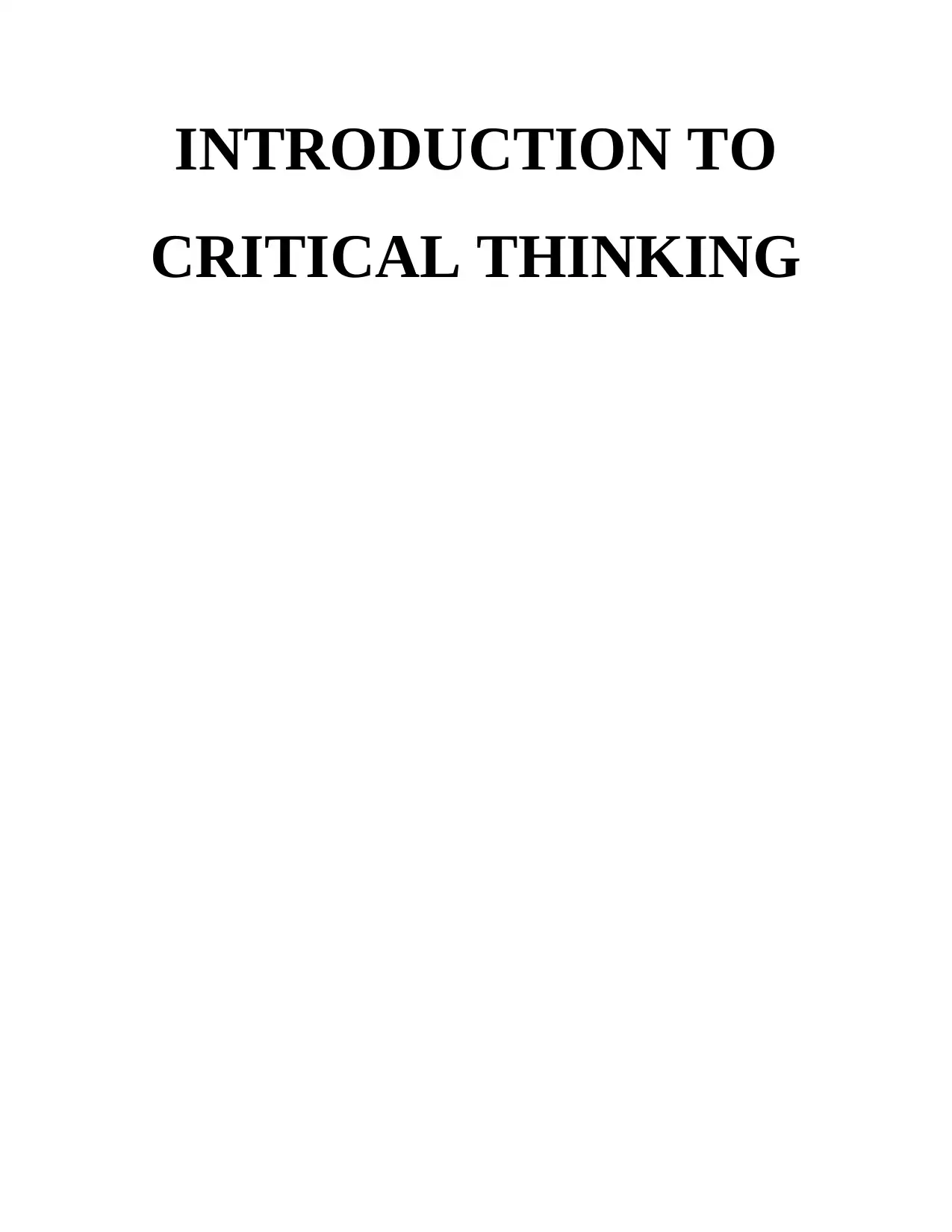
INTRODUCTION TO
CRITICAL THINKING
CRITICAL THINKING
Paraphrase This Document
Need a fresh take? Get an instant paraphrase of this document with our AI Paraphraser
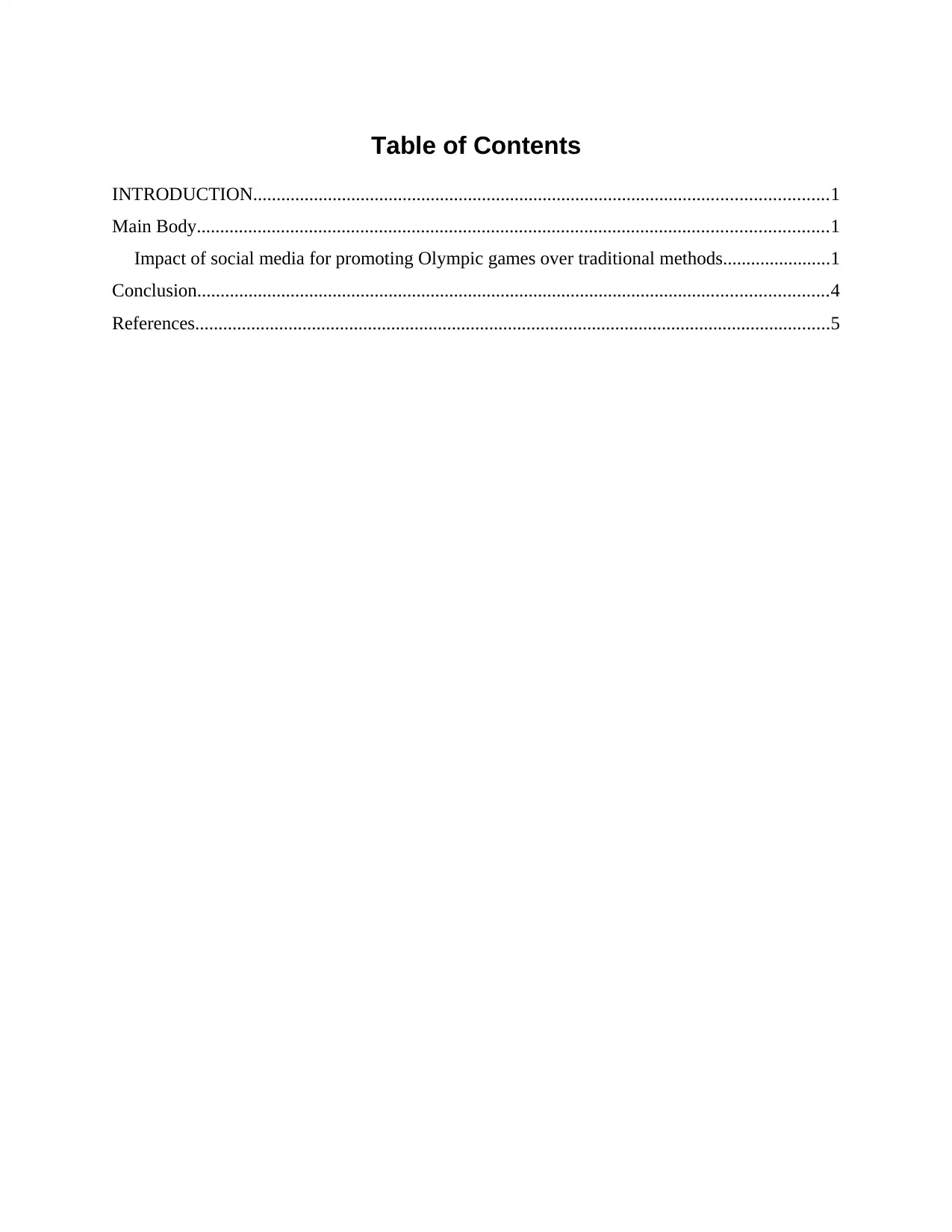
Table of Contents
INTRODUCTION...........................................................................................................................1
Main Body.......................................................................................................................................1
Impact of social media for promoting Olympic games over traditional methods.......................1
Conclusion.......................................................................................................................................4
References........................................................................................................................................5
INTRODUCTION...........................................................................................................................1
Main Body.......................................................................................................................................1
Impact of social media for promoting Olympic games over traditional methods.......................1
Conclusion.......................................................................................................................................4
References........................................................................................................................................5
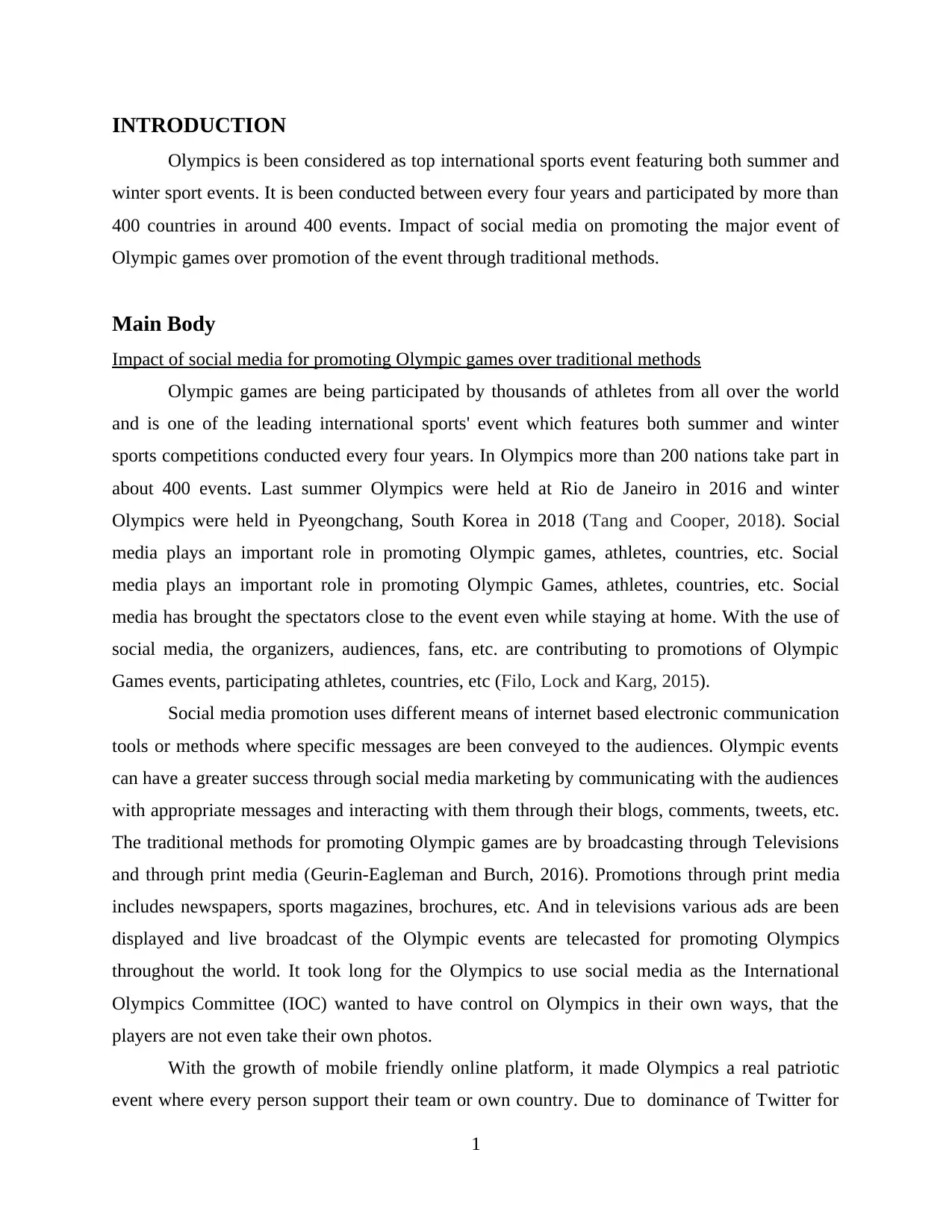
INTRODUCTION
Olympics is been considered as top international sports event featuring both summer and
winter sport events. It is been conducted between every four years and participated by more than
400 countries in around 400 events. Impact of social media on promoting the major event of
Olympic games over promotion of the event through traditional methods.
Main Body
Impact of social media for promoting Olympic games over traditional methods
Olympic games are being participated by thousands of athletes from all over the world
and is one of the leading international sports' event which features both summer and winter
sports competitions conducted every four years. In Olympics more than 200 nations take part in
about 400 events. Last summer Olympics were held at Rio de Janeiro in 2016 and winter
Olympics were held in Pyeongchang, South Korea in 2018 (Tang and Cooper, 2018). Social
media plays an important role in promoting Olympic games, athletes, countries, etc. Social
media plays an important role in promoting Olympic Games, athletes, countries, etc. Social
media has brought the spectators close to the event even while staying at home. With the use of
social media, the organizers, audiences, fans, etc. are contributing to promotions of Olympic
Games events, participating athletes, countries, etc (Filo, Lock and Karg, 2015).
Social media promotion uses different means of internet based electronic communication
tools or methods where specific messages are been conveyed to the audiences. Olympic events
can have a greater success through social media marketing by communicating with the audiences
with appropriate messages and interacting with them through their blogs, comments, tweets, etc.
The traditional methods for promoting Olympic games are by broadcasting through Televisions
and through print media (Geurin-Eagleman and Burch, 2016). Promotions through print media
includes newspapers, sports magazines, brochures, etc. And in televisions various ads are been
displayed and live broadcast of the Olympic events are telecasted for promoting Olympics
throughout the world. It took long for the Olympics to use social media as the International
Olympics Committee (IOC) wanted to have control on Olympics in their own ways, that the
players are not even take their own photos.
With the growth of mobile friendly online platform, it made Olympics a real patriotic
event where every person support their team or own country. Due to dominance of Twitter for
1
Olympics is been considered as top international sports event featuring both summer and
winter sport events. It is been conducted between every four years and participated by more than
400 countries in around 400 events. Impact of social media on promoting the major event of
Olympic games over promotion of the event through traditional methods.
Main Body
Impact of social media for promoting Olympic games over traditional methods
Olympic games are being participated by thousands of athletes from all over the world
and is one of the leading international sports' event which features both summer and winter
sports competitions conducted every four years. In Olympics more than 200 nations take part in
about 400 events. Last summer Olympics were held at Rio de Janeiro in 2016 and winter
Olympics were held in Pyeongchang, South Korea in 2018 (Tang and Cooper, 2018). Social
media plays an important role in promoting Olympic games, athletes, countries, etc. Social
media plays an important role in promoting Olympic Games, athletes, countries, etc. Social
media has brought the spectators close to the event even while staying at home. With the use of
social media, the organizers, audiences, fans, etc. are contributing to promotions of Olympic
Games events, participating athletes, countries, etc (Filo, Lock and Karg, 2015).
Social media promotion uses different means of internet based electronic communication
tools or methods where specific messages are been conveyed to the audiences. Olympic events
can have a greater success through social media marketing by communicating with the audiences
with appropriate messages and interacting with them through their blogs, comments, tweets, etc.
The traditional methods for promoting Olympic games are by broadcasting through Televisions
and through print media (Geurin-Eagleman and Burch, 2016). Promotions through print media
includes newspapers, sports magazines, brochures, etc. And in televisions various ads are been
displayed and live broadcast of the Olympic events are telecasted for promoting Olympics
throughout the world. It took long for the Olympics to use social media as the International
Olympics Committee (IOC) wanted to have control on Olympics in their own ways, that the
players are not even take their own photos.
With the growth of mobile friendly online platform, it made Olympics a real patriotic
event where every person support their team or own country. Due to dominance of Twitter for
1
⊘ This is a preview!⊘
Do you want full access?
Subscribe today to unlock all pages.

Trusted by 1+ million students worldwide
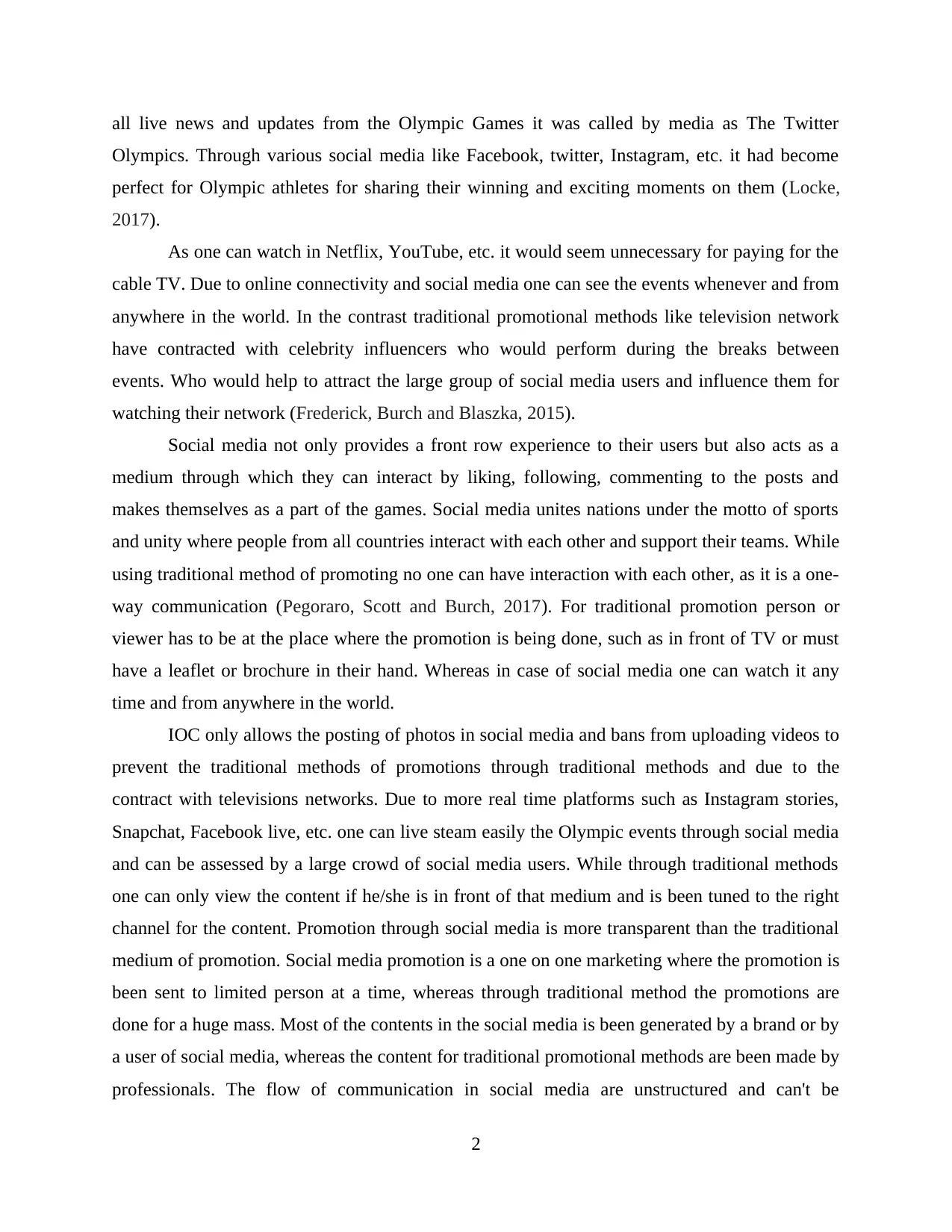
all live news and updates from the Olympic Games it was called by media as The Twitter
Olympics. Through various social media like Facebook, twitter, Instagram, etc. it had become
perfect for Olympic athletes for sharing their winning and exciting moments on them (Locke,
2017).
As one can watch in Netflix, YouTube, etc. it would seem unnecessary for paying for the
cable TV. Due to online connectivity and social media one can see the events whenever and from
anywhere in the world. In the contrast traditional promotional methods like television network
have contracted with celebrity influencers who would perform during the breaks between
events. Who would help to attract the large group of social media users and influence them for
watching their network (Frederick, Burch and Blaszka, 2015).
Social media not only provides a front row experience to their users but also acts as a
medium through which they can interact by liking, following, commenting to the posts and
makes themselves as a part of the games. Social media unites nations under the motto of sports
and unity where people from all countries interact with each other and support their teams. While
using traditional method of promoting no one can have interaction with each other, as it is a one-
way communication (Pegoraro, Scott and Burch, 2017). For traditional promotion person or
viewer has to be at the place where the promotion is being done, such as in front of TV or must
have a leaflet or brochure in their hand. Whereas in case of social media one can watch it any
time and from anywhere in the world.
IOC only allows the posting of photos in social media and bans from uploading videos to
prevent the traditional methods of promotions through traditional methods and due to the
contract with televisions networks. Due to more real time platforms such as Instagram stories,
Snapchat, Facebook live, etc. one can live steam easily the Olympic events through social media
and can be assessed by a large crowd of social media users. While through traditional methods
one can only view the content if he/she is in front of that medium and is been tuned to the right
channel for the content. Promotion through social media is more transparent than the traditional
medium of promotion. Social media promotion is a one on one marketing where the promotion is
been sent to limited person at a time, whereas through traditional method the promotions are
done for a huge mass. Most of the contents in the social media is been generated by a brand or by
a user of social media, whereas the content for traditional promotional methods are been made by
professionals. The flow of communication in social media are unstructured and can't be
2
Olympics. Through various social media like Facebook, twitter, Instagram, etc. it had become
perfect for Olympic athletes for sharing their winning and exciting moments on them (Locke,
2017).
As one can watch in Netflix, YouTube, etc. it would seem unnecessary for paying for the
cable TV. Due to online connectivity and social media one can see the events whenever and from
anywhere in the world. In the contrast traditional promotional methods like television network
have contracted with celebrity influencers who would perform during the breaks between
events. Who would help to attract the large group of social media users and influence them for
watching their network (Frederick, Burch and Blaszka, 2015).
Social media not only provides a front row experience to their users but also acts as a
medium through which they can interact by liking, following, commenting to the posts and
makes themselves as a part of the games. Social media unites nations under the motto of sports
and unity where people from all countries interact with each other and support their teams. While
using traditional method of promoting no one can have interaction with each other, as it is a one-
way communication (Pegoraro, Scott and Burch, 2017). For traditional promotion person or
viewer has to be at the place where the promotion is being done, such as in front of TV or must
have a leaflet or brochure in their hand. Whereas in case of social media one can watch it any
time and from anywhere in the world.
IOC only allows the posting of photos in social media and bans from uploading videos to
prevent the traditional methods of promotions through traditional methods and due to the
contract with televisions networks. Due to more real time platforms such as Instagram stories,
Snapchat, Facebook live, etc. one can live steam easily the Olympic events through social media
and can be assessed by a large crowd of social media users. While through traditional methods
one can only view the content if he/she is in front of that medium and is been tuned to the right
channel for the content. Promotion through social media is more transparent than the traditional
medium of promotion. Social media promotion is a one on one marketing where the promotion is
been sent to limited person at a time, whereas through traditional method the promotions are
done for a huge mass. Most of the contents in the social media is been generated by a brand or by
a user of social media, whereas the content for traditional promotional methods are been made by
professionals. The flow of communication in social media are unstructured and can't be
2
Paraphrase This Document
Need a fresh take? Get an instant paraphrase of this document with our AI Paraphraser
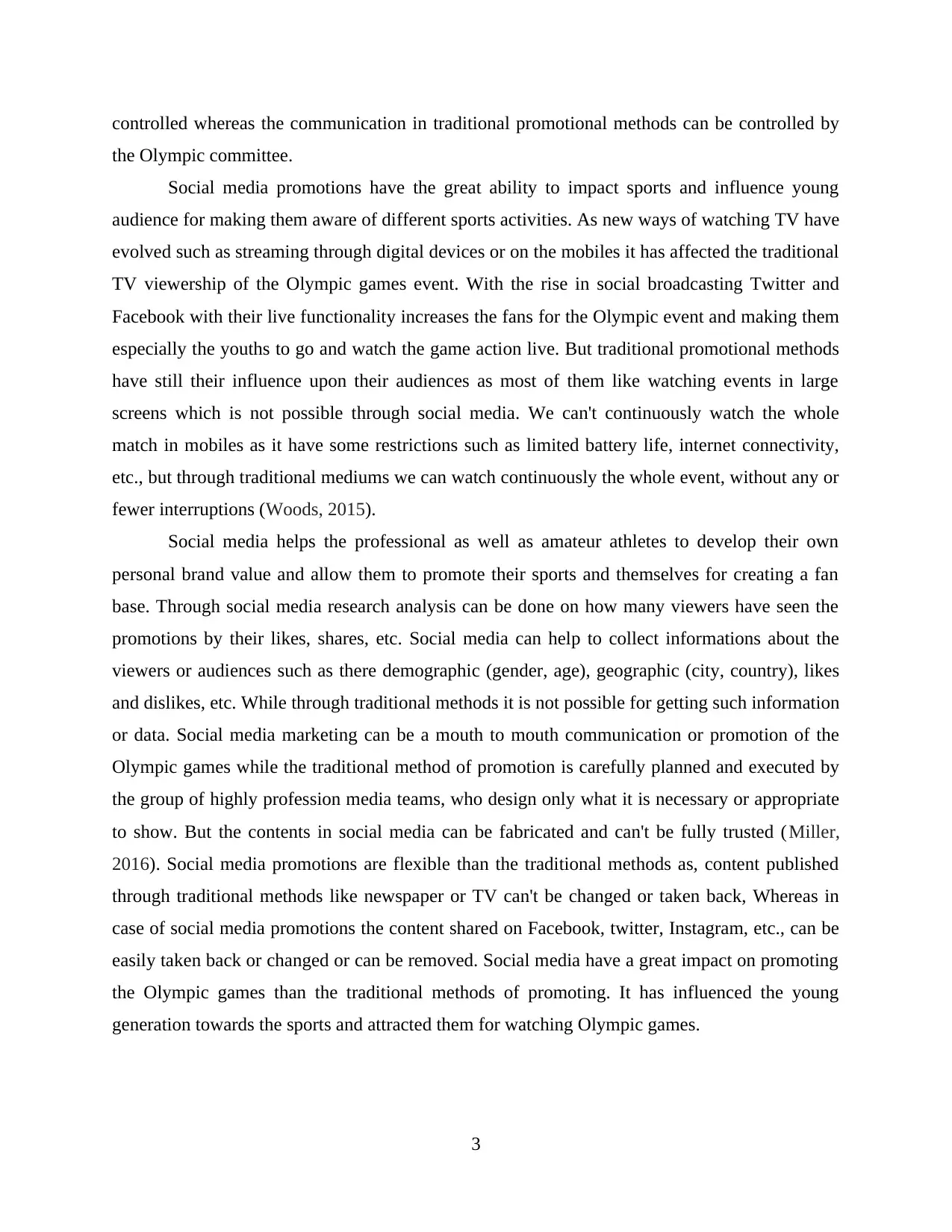
controlled whereas the communication in traditional promotional methods can be controlled by
the Olympic committee.
Social media promotions have the great ability to impact sports and influence young
audience for making them aware of different sports activities. As new ways of watching TV have
evolved such as streaming through digital devices or on the mobiles it has affected the traditional
TV viewership of the Olympic games event. With the rise in social broadcasting Twitter and
Facebook with their live functionality increases the fans for the Olympic event and making them
especially the youths to go and watch the game action live. But traditional promotional methods
have still their influence upon their audiences as most of them like watching events in large
screens which is not possible through social media. We can't continuously watch the whole
match in mobiles as it have some restrictions such as limited battery life, internet connectivity,
etc., but through traditional mediums we can watch continuously the whole event, without any or
fewer interruptions (Woods, 2015).
Social media helps the professional as well as amateur athletes to develop their own
personal brand value and allow them to promote their sports and themselves for creating a fan
base. Through social media research analysis can be done on how many viewers have seen the
promotions by their likes, shares, etc. Social media can help to collect informations about the
viewers or audiences such as there demographic (gender, age), geographic (city, country), likes
and dislikes, etc. While through traditional methods it is not possible for getting such information
or data. Social media marketing can be a mouth to mouth communication or promotion of the
Olympic games while the traditional method of promotion is carefully planned and executed by
the group of highly profession media teams, who design only what it is necessary or appropriate
to show. But the contents in social media can be fabricated and can't be fully trusted (Miller,
2016). Social media promotions are flexible than the traditional methods as, content published
through traditional methods like newspaper or TV can't be changed or taken back, Whereas in
case of social media promotions the content shared on Facebook, twitter, Instagram, etc., can be
easily taken back or changed or can be removed. Social media have a great impact on promoting
the Olympic games than the traditional methods of promoting. It has influenced the young
generation towards the sports and attracted them for watching Olympic games.
3
the Olympic committee.
Social media promotions have the great ability to impact sports and influence young
audience for making them aware of different sports activities. As new ways of watching TV have
evolved such as streaming through digital devices or on the mobiles it has affected the traditional
TV viewership of the Olympic games event. With the rise in social broadcasting Twitter and
Facebook with their live functionality increases the fans for the Olympic event and making them
especially the youths to go and watch the game action live. But traditional promotional methods
have still their influence upon their audiences as most of them like watching events in large
screens which is not possible through social media. We can't continuously watch the whole
match in mobiles as it have some restrictions such as limited battery life, internet connectivity,
etc., but through traditional mediums we can watch continuously the whole event, without any or
fewer interruptions (Woods, 2015).
Social media helps the professional as well as amateur athletes to develop their own
personal brand value and allow them to promote their sports and themselves for creating a fan
base. Through social media research analysis can be done on how many viewers have seen the
promotions by their likes, shares, etc. Social media can help to collect informations about the
viewers or audiences such as there demographic (gender, age), geographic (city, country), likes
and dislikes, etc. While through traditional methods it is not possible for getting such information
or data. Social media marketing can be a mouth to mouth communication or promotion of the
Olympic games while the traditional method of promotion is carefully planned and executed by
the group of highly profession media teams, who design only what it is necessary or appropriate
to show. But the contents in social media can be fabricated and can't be fully trusted (Miller,
2016). Social media promotions are flexible than the traditional methods as, content published
through traditional methods like newspaper or TV can't be changed or taken back, Whereas in
case of social media promotions the content shared on Facebook, twitter, Instagram, etc., can be
easily taken back or changed or can be removed. Social media have a great impact on promoting
the Olympic games than the traditional methods of promoting. It has influenced the young
generation towards the sports and attracted them for watching Olympic games.
3
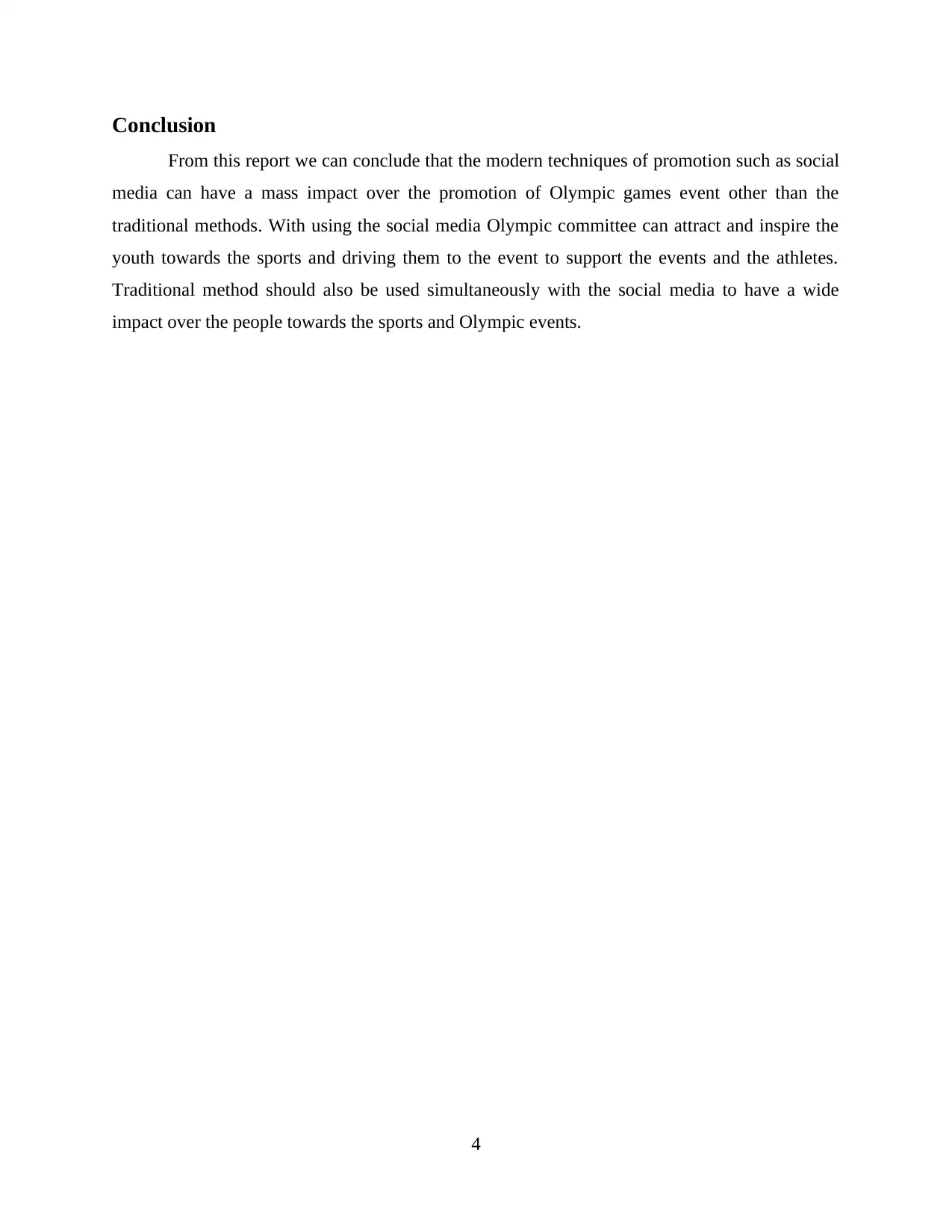
Conclusion
From this report we can conclude that the modern techniques of promotion such as social
media can have a mass impact over the promotion of Olympic games event other than the
traditional methods. With using the social media Olympic committee can attract and inspire the
youth towards the sports and driving them to the event to support the events and the athletes.
Traditional method should also be used simultaneously with the social media to have a wide
impact over the people towards the sports and Olympic events.
4
From this report we can conclude that the modern techniques of promotion such as social
media can have a mass impact over the promotion of Olympic games event other than the
traditional methods. With using the social media Olympic committee can attract and inspire the
youth towards the sports and driving them to the event to support the events and the athletes.
Traditional method should also be used simultaneously with the social media to have a wide
impact over the people towards the sports and Olympic events.
4
⊘ This is a preview!⊘
Do you want full access?
Subscribe today to unlock all pages.

Trusted by 1+ million students worldwide
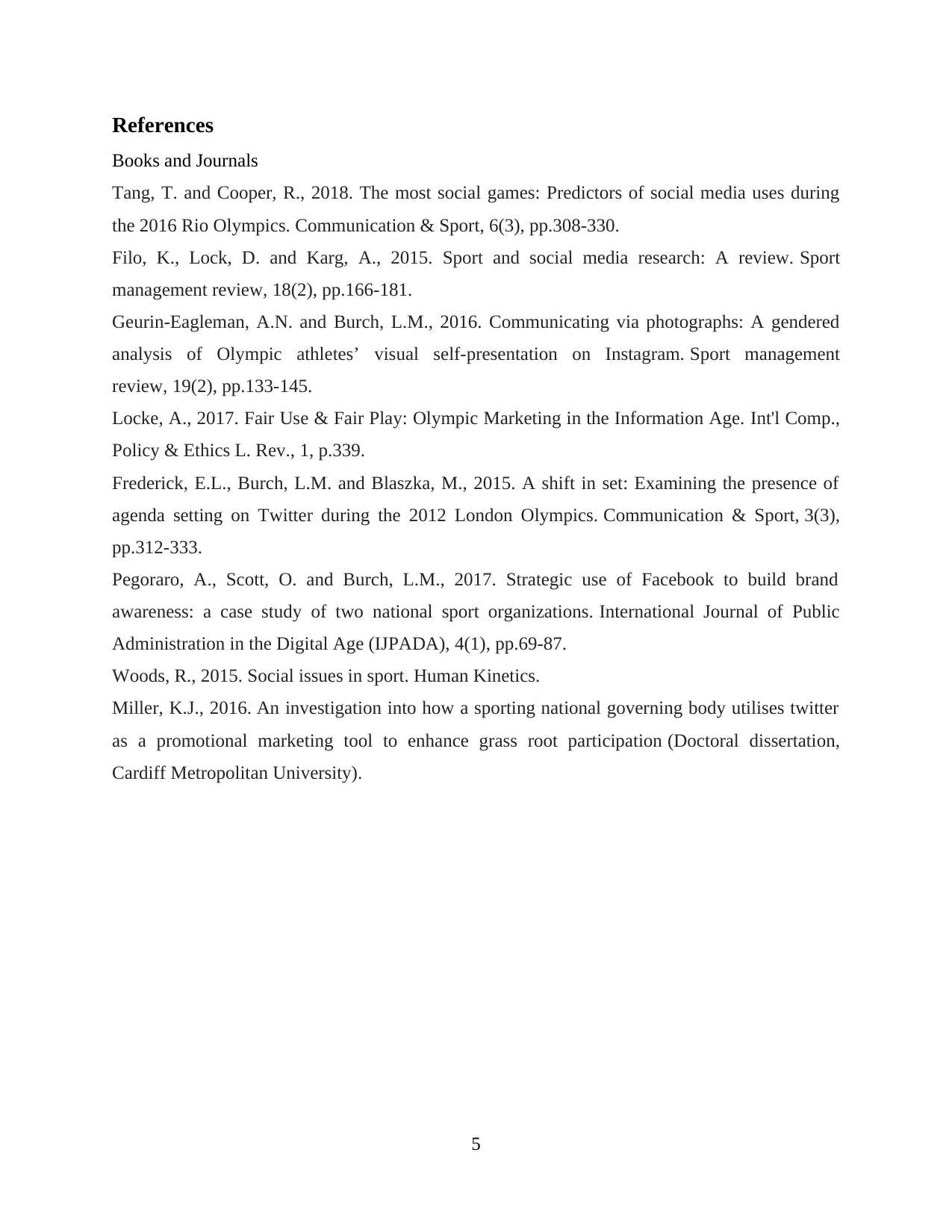
References
Books and Journals
Tang, T. and Cooper, R., 2018. The most social games: Predictors of social media uses during
the 2016 Rio Olympics. Communication & Sport, 6(3), pp.308-330.
Filo, K., Lock, D. and Karg, A., 2015. Sport and social media research: A review. Sport
management review, 18(2), pp.166-181.
Geurin-Eagleman, A.N. and Burch, L.M., 2016. Communicating via photographs: A gendered
analysis of Olympic athletes’ visual self-presentation on Instagram. Sport management
review, 19(2), pp.133-145.
Locke, A., 2017. Fair Use & Fair Play: Olympic Marketing in the Information Age. Int'l Comp.,
Policy & Ethics L. Rev., 1, p.339.
Frederick, E.L., Burch, L.M. and Blaszka, M., 2015. A shift in set: Examining the presence of
agenda setting on Twitter during the 2012 London Olympics. Communication & Sport, 3(3),
pp.312-333.
Pegoraro, A., Scott, O. and Burch, L.M., 2017. Strategic use of Facebook to build brand
awareness: a case study of two national sport organizations. International Journal of Public
Administration in the Digital Age (IJPADA), 4(1), pp.69-87.
Woods, R., 2015. Social issues in sport. Human Kinetics.
Miller, K.J., 2016. An investigation into how a sporting national governing body utilises twitter
as a promotional marketing tool to enhance grass root participation (Doctoral dissertation,
Cardiff Metropolitan University).
5
Books and Journals
Tang, T. and Cooper, R., 2018. The most social games: Predictors of social media uses during
the 2016 Rio Olympics. Communication & Sport, 6(3), pp.308-330.
Filo, K., Lock, D. and Karg, A., 2015. Sport and social media research: A review. Sport
management review, 18(2), pp.166-181.
Geurin-Eagleman, A.N. and Burch, L.M., 2016. Communicating via photographs: A gendered
analysis of Olympic athletes’ visual self-presentation on Instagram. Sport management
review, 19(2), pp.133-145.
Locke, A., 2017. Fair Use & Fair Play: Olympic Marketing in the Information Age. Int'l Comp.,
Policy & Ethics L. Rev., 1, p.339.
Frederick, E.L., Burch, L.M. and Blaszka, M., 2015. A shift in set: Examining the presence of
agenda setting on Twitter during the 2012 London Olympics. Communication & Sport, 3(3),
pp.312-333.
Pegoraro, A., Scott, O. and Burch, L.M., 2017. Strategic use of Facebook to build brand
awareness: a case study of two national sport organizations. International Journal of Public
Administration in the Digital Age (IJPADA), 4(1), pp.69-87.
Woods, R., 2015. Social issues in sport. Human Kinetics.
Miller, K.J., 2016. An investigation into how a sporting national governing body utilises twitter
as a promotional marketing tool to enhance grass root participation (Doctoral dissertation,
Cardiff Metropolitan University).
5
1 out of 7
Related Documents
Your All-in-One AI-Powered Toolkit for Academic Success.
+13062052269
info@desklib.com
Available 24*7 on WhatsApp / Email
![[object Object]](/_next/static/media/star-bottom.7253800d.svg)
Unlock your academic potential
Copyright © 2020–2026 A2Z Services. All Rights Reserved. Developed and managed by ZUCOL.





